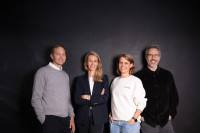Of Cycles, Spiral Dynamics, and the Infinite Game
200 Zeichen Lorem ipsum dolor sit amet, consectetuer adipiscing elit. Aenean commodo ligula eget dolor. Aenean massa. Cum sociis natoque penatibus et magnis dis parturient montes, nascetur ridiculus mus. Donec quu.
Kim Notz
11. June 2024
Starting a business means joining a game that began long before you — and that has no end. Simon Sinek described this in his 2019 book The Infinite Game. For agencies, that idea can feel unfamiliar, since few client relationships last as long as we might wish. And collaboration setups with other agencies also tend to change quickly.
Still, there is real value in approaching cross-agency collaboration not as a way to squeeze out the maximum in the short term, but as a way to build long-term relationships. In the end, that makes the pie bigger for both sides. This is how Max Orgeldinger, Co-CEO of TLGG alongside Annabelle Jenisch, described both the mindset and the challenge when the two joined me as guests on episode #113.
Collaboration, however, cannot escape the prisoner’s dilemma: as soon as one partner stops collaborating, the other reliably loses. The risk remains — which is why personal, individual relationships, often built over decades, are the best currency our industry has. The Infinite Game. Agency work is, and always will be, a people business — with trust as one of its most valuable resources.
The same holds true within teams, where working with other business units or outside agencies often comes with change and uncertainty. Since 2015, TLGG has been part of the Omnicom Group, which naturally brings with it a high degree of collaboration. Getting to know one another — and learning what expertise exists elsewhere in the organization — is a task in its own right.
Social Media Is Dead, Micromanagement Lives On
And above all, it is a management responsibility to convey this to the teams. Max Orgeldinger refers to it — half-ironically — as micromanagement. Management needs to be close enough to projects and day-to-day operations to spot opportunities for collaboration and connect teams with potential partners.
Of course, this is not without conflict — and at TLGG, it is part of the agency’s identity to embrace those conflicts. They are the price of combining different specializations and cultures. Diverging interests, fears, and concerns need to be put on the table and negotiated.
“The more people do this, the more they recognize the advantages it brings,” as Annabelle Jenisch puts it. The more often teams work alongside other business units or different parts of Omnicom within a project, the more they grow from the experience. Over time, this creates a positive flywheel effect — making collaboration easier and more natural with every iteration.
Lorem ipsum dolor sit amet, adipiscing elit.
Christoph Bornschein, Fränzi Kühne, and Boontham Temaismithi founded TLGG in 2008 — back then under the full name “Torben, Lucie und die gelbe Gefahr” — cleverly marketed as Germany’s first social media agency. Social media remains the company’s core business to this day, even though the term itself has become misleading, as Max provocatively puts it: “Social media has been dead for years.”
Most of the content people consume now comes from professionals who make their living from it. “In my opinion, we’re a bit naïve if we pretend it’s still all that social. These are simply today’s media,” he adds.
Seen in this light, the supposed niche is far bigger than it first appears. What is still called social media — for lack of a better term — remains the starting point for TLGG’s understanding of marketing and communications: natively digital, always designed with digital channels in mind, and rooted in observing user behavior there.
Breaking Free from the Advertising Trap
From there, TLGG develops marketing strategies designed to work across channels. The product itself also has to be part of that thinking. This understanding of marketing goes beyond what is often described as the advertising trap: the self-reduction of marketing to mere promotion while neglecting the other three Ps — Price, Product, and Place. Both strongly believe that marketing can once again be approached in a more holistic way.
This is also the foundation for agencies to claim their share of the pie in competition with traditional consultancies — and to join these discussions as equals. A key prerequisite, however, is that the marketing department itself is properly positioned. That depends not only on the maturity level of the organization, but also, in many cases, on the standing and positioning of the CMO.
Lorem ipsum dolor sit amet, adipiscing elit.
From its commitment to a holistic understanding of marketing arises the bridge to consulting — the second arm of TLGG alongside the agency. The two operate as separate companies. Consulting required its own space, since it follows a different business model, deals with different kinds of questions, and addresses different buying centers on the client side. In the agency world, “consulting” is interpreted in many different ways, but TLGG Consulting competes more directly with management consultancies like BCG or McKinsey.
Given the growing complexity of client challenges, TLGG is now bringing the two parts — with their distinct competencies — closer together. Stronger integration is driven not only by content-related reasons but also by client demand. Large networks like Omnicom justify their existence partly through the fact that global corporations tend to award large budgets and prefer to have everything delivered from a single source. For a mid-sized group like TLGG, now with around 250 people, integrated work is therefore the only viable path forward — including collaborations with networks outside of Omnicom.
Spiral Dynamics
In the long run, both in society and in agency life, we can observe spiral-shaped movements with an upward tendency. Organizational principles such as centralization or decentralization may return in cycles, but always with a twist. New experiences and insights are added — it is not simply the eternal recurrence of the same. Collectively, we learn. This is the optimistic perspective developed by Don Beck and Chris Cowan in Spiral Dynamics: on the one hand, curiosity and constant self-renewal, on the other hand, the return of what is already known — but now seen with new knowledge and from a new angle.
This is also why we cannot simply skip over individual phases. Much of what today falls under the label New Work, Annabelle and Max now view with a critical eye — which doesn’t mean they haven’t tried it all themselves. Today, they aim to optimize their leadership style around good communication rather than focusing on freedom or other central values of the New Work cosmos. The sheer size of the TLGG group alone limits freedom compared to its founding phase. And, though they don’t spell it out, so does being part of a publicly listed network.
Yet they see making these restrictions transparent and comprehensible to their teams as more modern and more humane than the current obsession with freedom and a purely freedom-loving culture. Annabelle, in particular, considers it her responsibility to give teams a clear sense of where they stand and why the two leaders act as they do.
Find more here:
Kontakt





